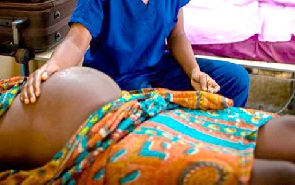Dr Patrick Kuma-Aboagye, the Director-General of the Ghana Health Service (GHS), on Friday, said through the collaborative sacrifices of stakeholders in health, Ghana has witnessed significant improvements in maternal and newborn health outcomes.
According to him, as of the close of last year, neonatal mortality decreased from 7.1 per 10,000 live births to 6.5 per 10,000 births, whilst institutional maternal mortality ratio decreased marginally from 111 per 100,000 live births to 102 per 100,000 live births.
Similarly, the total of maternal deaths decreased by some 70, moving from 875 deaths in 2021 to 805 deaths at the close of 2022.
The Director-General of GHS disclosed this at the launch of the 32nd International Day of Midwives (IDM) put together by the Ghana Registered Midwives Association (GRMA) in Cape Coast on Friday.
“Together again, from evidence to reality,” was the carefully chosen theme for the programme to draw attention to the need for Governments and non-state actors to invest in training more midwives for the improvement of maternal and newborn health outcomes.
“Haemoglobin checks at registration and the incidence of anaemia in late pregnancy as at 36 weeks have been on a decreasing trend over the past couple of years.
“Skilled delivery coverage and antenatal care (ANC) clients making 4th visits have been on an increasing trajectory over the past years,” Dr Kuma-Aboagye stated.
The Day was also used to honour some 22 Midwives drawn from health facilities across the country for their dedication and commitment to duty after a thorough selection process.
The awardees were presented with table-top freezers, tablets, and a plaque.
IDM is recognized around the world as a celebration of midwives and their contribution to women’s and newborns’ health and wellbeing.
It is also to recognize and appreciate the work of midwives and raise awareness of the essential care that midwives provide in the areas of maternal and newborn care.
The International Confederation of Midwives (ICM) formally launched the idea of the ‘International Day of the Midwife’ in 1992 after suggestions and discussions with Midwifery Associations around the world.
Celebrated globally on May 5, the annual programme supported by UNFPA and USAID was interspersed with cultural displays from the Cape Coast School for the Deaf and Blind and drew scores of health-related personnel, traditional and religious leaders.
Dr Kuma-Aboagye said the absolute number of the country’s midwifery workforce has also been increasing, positioning Ghana to surpass the WHO standard of 6–7 midwives per 1000 institutional deliveries, by almost two folds, to 13 midwives per 1000 institutional deliveries.
The Midwife to Women in fertility age (WIFA) ratio had equally been improving, moving from one midwife to 720 women in fertility age in 2017 to one midwife to 387 women in fertility age in 2021.
While highlighting the contributions of midwives which led to improved health outcomes, he indicated that they continue to work under harsh conditions, “oftentimes at the peril of their progress and cost to their families.”
That he said includes challenges relating to the pre-service training of midwives, in-service work environment and others associated with their continuous professional development.
“If, as a country, we intend to attain the maternal and newborn health outcomes we desire, we would need to come together once more and move from the glaring evidence that midwives indeed save lives to addressing the challenges that confront midwives in reality.”
He proposed a restructuring of Ghana’s health system to promote midwifery leadership at all levels, embrace midwifery innovation, encourage evidence-based practice, and institute the character of empathy in our midwives, allowing for the practice to be guided by the sensitivities of our clients.
“We must also begin to match the evidence of smaller class sizes, availability of preceptors and requisite faculty with the realities of larger class sizes and inadequate skill mix and number of faculty in the pre-service training and continuous professional development of our midwives.
“I have, as a result, in my own small ways, increased the study leave quota significantly for serving midwives of GHS who intend to pursue further studies and consulted the Ghana College of Nurses and Midwives on proposed residency programmes for midwives,” he said.
Collectively, he urged GRMA and other Sister associations to set standards to maintain excellence, commitment to duty, and play the very critical role of identifying potential leaders to develop a critical mass of empowered midwives who will advocate for the profession, the mother, and the newborn.
Mrs Netta Forson Ackon, the President of GRMA called for better working conditions and remuneration for Midwives as they battle challenging times at work.
Mrs Tina Mensah, the Deputy Minister of Health who launched the 32nd International Day of Midwives, commended them for going all out to save lives and pledged the government’s support for them.
Health News of Saturday, 6 May 2023
Source: GNA

















